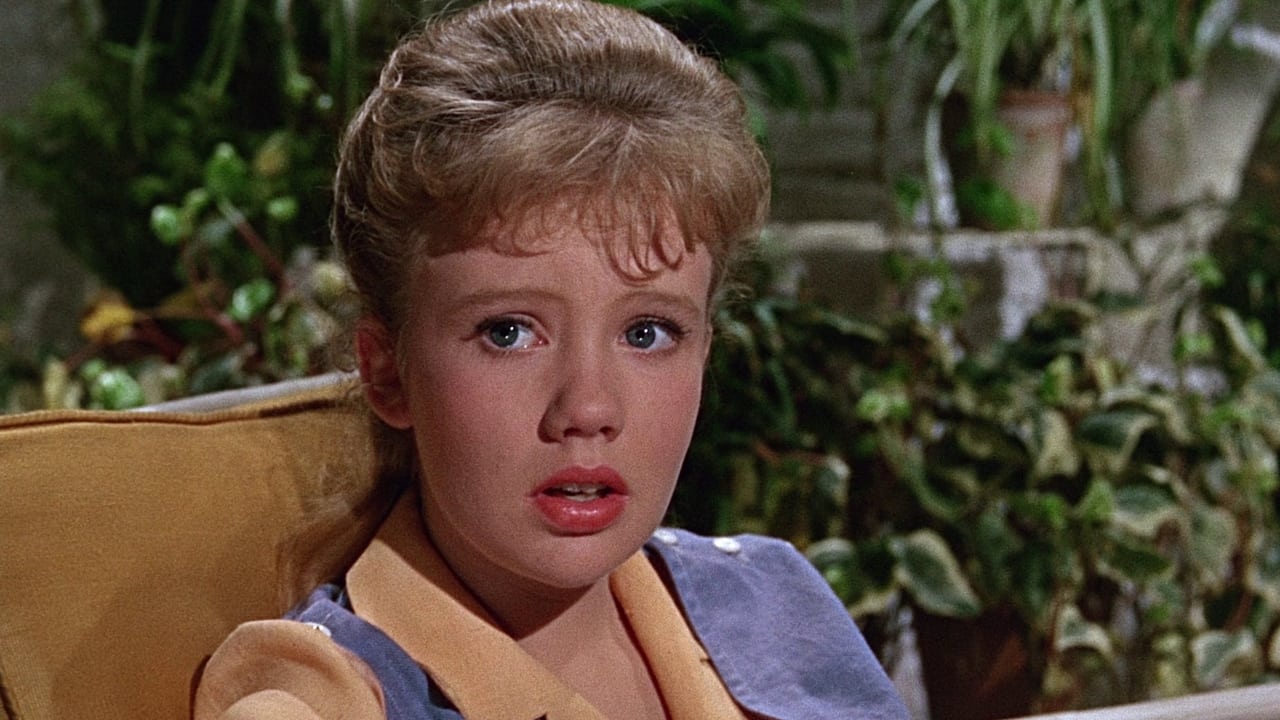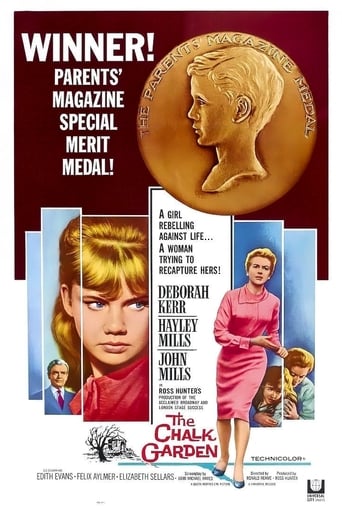

Brilliant and touching
... View MoreAbsolutely the worst movie.
... View MoreThis film is so real. It treats its characters with so much care and sensitivity.
... View MoreEasily the biggest piece of Right wing non sense propaganda I ever saw.
... View MoreThe names associated with this production are British, but Enid Bagnold's drama has been given the Hollywood treatment with lavish production values courtesy of producer Ross Hunter. Known for Imitation of Life (1959), Madame X (1966), Airport (1970) and the disastrous musical remake of Lost Horizon (1973), Hunter originally had Sandra Dee in mind for the part of Laurel, and Hayley Mills' comes across as wholesome if slightly more troubled than the mischievous Mary Clancy she played in The Trouble with Angels. The film presents flattened out versions of the various odd and eccentric characters that inhabited the play with the result being closer to Disney than Bagnold. Adequate performances from all with Kerr managing to create an air of mystery and complexity that makes the film watchable.
... View More"The Chalk Garden" is a largely forgotten screen treasure. It focuses on Laurel, a troubled 16-year-old who moved in with her grandmother, Mrs. St. Maugham, in protest against her mother's re-marriage. Mrs. St. Maugham hired various governesses to deal with Laurel; but the young girl quickly drove them away. They failed to comprehend her; but she discovered their deepest secrets, and immediately conveyed these to her grandmother, leading to the dismissals of a succession of governesses. When Mrs. St. Maugham hires Miss Madrigal as the new governess, the tables are turned. Laurel cannot figure out Madrigal—an enigmatic figure, who, although almost aristocratic in bearing, is unable to provide any references. But Madrigal completely comprehends Laurel at once. Olivia, Laurel's mother, plans to reclaim custody of her daughter; but Mrs. St. Maugham is determined to prevent this. Meanwhile, Maitland, the butler/general factotum, tries to keep the household on an even keel.That there is a certain complexity to each of these characters adds credibility and interest to the story. Laurel is a highly inquisitive, intelligent, and analytical person, whose judgments are sometimes very perceptive. Often disrespectful and occasionally obnoxious, in private, Laurel is tormented by loneliness and grief. Mrs. St. Maugham is a generous but domineering woman—she wants the best for Olivia, but feels compelled to impose her choices on her daughter. And Maitland is recovering from his own personal tragedy.There are some weaknesses in the screenplay. In an early scene, Laurel urges Madrigal to smile more because she is beautiful when she smiles, then comments that Madrigal is "quite accomplished" as an artist, and then indicates that she values the governess' compliments about her own painting. It appears that there is in Laurel's view of Madrigal an element of admiration that she had not felt for her other governesses. But the screenplay does not develop Laurel's ambivalent feelings, although these are an important part of the story. Similarly, Olivia's maternal feelings are not much in evidence. We see Olivia primarily in confrontation with her mother. For four years, she has failed to contest custody of Laurel, for reasons that are not satisfactorily explained. Even now, Olivia says she is trying to regain Laurel because she is "my daughter, not yours"—which suggests there is an element of competition as well as compassion in her custody battle. Finally, the screenplay makes an effort to soften Madrigal's past. This weakens the plot. If Madrigal's travails resulted only from a failure of the justice system, what is the relevance of her experience for Laurel's situation? But the script is fundamentally strong. It stimulates concern about Laurel and weaves an air of mystery around Madrigal. It also limns the personalities of the principal characters, and shows how the outcome of the story has implications for all of them. Adult viewers may find themselves waiting to see who will finally tame the troubled teenager. But, in a rather sudden and surprising fashion, Laurel's obnoxious façade is cracked when her own machinations reveal Madrigal's mysterious past. Following this event, a series of carefully crafted dialogs, each with a somewhat unexpected outcome, take the story to its conclusion.Undoubtedly, the greatest strength of "The Chalk Garden" is its world-class cast. And, in view of the extreme close-up photography in the most emotional moments, the actors had to master the tiniest details of their performances. This is the cast you might have assembled if you got your first choice of the actor for each role. Edith Evans (nominated for three Academy Awards from 1963-1967) as Mrs. St. Maugham, and Deborah Kerr (nominated for five Academy Awards from 1953-1960) as Madrigal, were ideal for the roles of the aristocratic elderly British lady and the reserved governess. Many actors could have portrayed an English butler, but, as Maitland, John Mills could also draw on varied talents to toss off insouciant comments to potential governesses and Mrs. Madrigal, and even engage in a physical confrontation with Laurel. The great gamble was to cast Hayley Mills as Laurel. Other cast members had years of experience and had played similar roles in the past. Although she had been nominated for two Academy Awards and had received a special honorary Academy Award, Ms. Mills was only 17, and had never portrayed anyone remotely like Laurel. She must have found certain scenes hugely challenging, as some required her to show almost every emotion and to give credibility to seemingly irrational mood swings. In this reviewers' opinion, it is perhaps her best on-screen performance, and should be required viewing for those who think Mills could portray only Pollyanna-type characters. Felix Aylmer, who had played many "gray eminence" roles, does well as Judge McWhirrey. But, as noted above, Elizabeth Sellars' performance as Olivia, is cramped by the script.The DVD version comes without peripherals, but (fortunately) is in 1.85:1 format. A pan-and-scan version would have been a disaster.
... View MoreIn her A&E "Biography", it was revealed that child actress Hayley Mills apparently got her first mediocre notices from critics with this film, but I do not know why. Mills is engaging and colorful as a 16-year-old with a mind of her own: willful, stubborn, and bratty, she's wonderful on-screen. Deborah Kerr is also very fine, cool-headed and mysteriously reserved playing the new governess in an emotionally-unbalanced household run by haughty matriarch Edith Evans. Talky but entertaining, lively adaptation of Enid Bagnold's play (the title a metaphor for growing something in an improper environment). Exceptionally well-directed by Ronald Neame, who carefully allows the story to unfold like a marvelous novel--one you can get lost in. All the performers, including John Mills as the chief caretaker, are first-rate. Worth finding. ***1/2 from ****
... View MoreWhat can I say! I'm just another Haley Mills fan like all the rest. In this role as Laurel, she is being precocious, over inquisitive, and a downright trouble maker as far as governesses are concerned. However, her incessant pursuit of trying to turn up details in their private lives really underscores a psychological imbalance in her own young life which eventually surfaces. Much does revolve around the fact of her being estranged from her mother as the tale unfolds.This is a lovely combination of real-life father, John Mills, in a fine supporting role, and Deborah Kerr as the well-meaning but beleaguered governess. Many scenes are emotionally intense yet so well acted that we are swept along in the story. The tangled threads of family relationships is gradually sorted out and priorities are set aright after much confusion and willfulness particularly in the obstinacy of the grandmother (Edith Evans), who performs with great dramatic vehemence near the conclusion. A touching, human story, a great play.
... View More